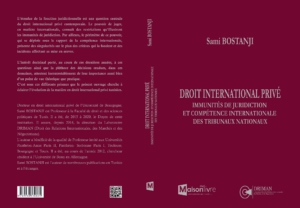 “Droit worldwide privé – Immunités de juridiction et competence internationales des tribunaux tunisiens” (Non-public Worldwide Legislation – Jurisdictional Immunity and Worldwide Jurisdiction of Tunisian Courts) is the title of the long-awaited guide not too long ago revealed by Prof. Sami Bostanji, a distinguished Professor on the Faculté de droit et des sciences politiques de Tunis, Director of the DRIMAN analysis heart, and one of many main non-public worldwide legislation students in Tunisia.
“Droit worldwide privé – Immunités de juridiction et competence internationales des tribunaux tunisiens” (Non-public Worldwide Legislation – Jurisdictional Immunity and Worldwide Jurisdiction of Tunisian Courts) is the title of the long-awaited guide not too long ago revealed by Prof. Sami Bostanji, a distinguished Professor on the Faculté de droit et des sciences politiques de Tunis, Director of the DRIMAN analysis heart, and one of many main non-public worldwide legislation students in Tunisia.
The guide represents the primary detailed and in-depth evaluation of the foundations and practices governing the judicial operate in Tunisian non-public worldwide Tunisian, considered by way of the lenses of jurisdictional immunities and worldwide adjudicative jurisdiction. It presents a scientific method to the topic drawing on the newest – and sometimes unpublished – selections of Tunisian courts. The creator justifies his deal with these two features of the judicial operate by highlighting “the significance of those points, each on a theoretical and sensible degree,” which—based on him—demonstrates a “shift within the heart of gravity” (déplacement du centre de gravité) in non-public worldwide legislation, shifting from conflicts of legal guidelines to conflicts of jurisdictions (p. 29, para. 16).
The guide, which follows the classical French two-parts plan, begins first with a basic introduction by which the creator discusses some key ideas, briefly introduces some features of the authorized the historical past of judicial jurisdiction in Tunisian non-public worldwide legislation, and examines the notion of internationality as a prerequisite for the operation of the non-public worldwide legislation system in Tunisia, in addition to the relevance of the topic.
The guide is then divided into two foremost elements.
Half One focuses on the examine of jurisdictional immunities, approached from the angle of “restrictions on the facility to adjudicate” (Les restrictions au pouvoir de juger). On this first half, the creator completely examines how immunities are regulated, beginning with the broader worldwide guidelines governing these points (Title I) earlier than delving into the options offered by Tunisian legislation, notably the Code of Non-public Worldwide Legislation (Title II). The creator highlights each authorized developments and sensible functions of those guidelines in Tunisian court docket selections.
Half Two explores the system of worldwide jurisdiction of Tunisian courts by way of the angle of “the capability to adjudicate” (l’aptitude à statuer). Right here, the creator analyzes the varied types by which this capability manifests (Les déclinaisons de l’aptitude à statuer), emphasizing their particular traits. This half is split into three titles.
Title I presents a theoretical evaluation of worldwide jurisdiction, inspecting its nature and guiding ideas.
Title II, which serves because the core of the guide, is devoted to the grounds of worldwide jurisdiction for Tunisian courts. These grounds will be derived from (restricted) worldwide or (primarily) home sources, both by way of statutory provisions or case legislation and canopy a variety of points. These embrace unique jurisdiction; basic jurisdiction based mostly – based on the creator – on the domicile of the defendant, the settlement of the events and connexity; particular jurisdiction justified by varied issues such because the safety of kids, proximity and administration of justice, location of property and many others.; the intricate challenge of nationality as floor of worldwide jurisdiction and discussion board necessitatis.
Title III addresses the challenges to the jurisdiction of Tunisian courts, together with circumstances the place the defendant contests jurisdiction, both by showing earlier than the court docket and elevating the difficulty or when the choose raises it ex officio. It additionally examines the implications of overseas proceedings (lis pendens) and overseas judgments (res judicata) on the jurisdiction of Tunisian courts.
In a nutshell, this guide gives a complete and detailed account of the speculation and follow of jurisdiction in Tunisia, making a major contribution to the sphere of personal worldwide legislation within the nation and overseas. Written in French, it presents French-speaking students and practitioners a invaluable alternative to realize insights into Tunisian jurisdictional guidelines. The publication of the guide is especially well timed, contemplating the continued discussions on jurisdiction inside the Hague Convention on Non-public Worldwide Legislation (HCCH). It certainly presents a brand new perspective which will show invaluable to these concerned in drafting future worldwide frameworks on jurisdiction to keep in mind completely different views and approaches from varied elements of the world, particularly from the standpoint of a North African and an Arab jurisdiction (though the creator highlights once in a while alongside the pages the “distinctive” side of the Tunisian regulation of the difficulty of jurisdiction as in comparison with different MENA Arab international locations).
Lastly, given the experience of the creator and his lengthy expertise as a devoted scholar and legislation professor, it’s hoped that this work can be adopted by additional volumes addressing different features of Tunisian non-public worldwide legislation, notably the popularity and enforcement of overseas judgments and selection of legislation.
In all probability a few of these features can be addressed in Prof. Bostanji’s forthcoming stimulating course titled “Secularization and Non-public Worldwide Legislation within the Arab International locations” which can be delivered throughout subsequent yr’s Summer time Programs on the Hague Academy of Worldwide Legislation, as not too long ago introduced. For extra particulars, see right here.
A lot stays to be seen and unveiled!!
The blurb of the guide reads as follows:
L’étendue de la fonction juridictionnelle est une query centrale du droit worldwide privé contemporain. Le pouvoir de juger, en matière internationale, connaît des restrictions qu’illustrent les immunités de juridictions. Par ailleurs, le périmètre de ce pouvoir, qui se déploie sous le rapport de la compétence internationale, présente des singularités sur le plan des critères qui la fondent et des incident affectant sa mise en œuvre. L’intérêt doctrinal porté, au cours de ces dernières années, à ces questions ainsi que la pléthore des décisions rendues, dans domaines, attentent incontestablement de leur significance aussi bien d’un level de vue théorique que pratique.C’est sous ces différents prismes que le présent ouvrage cherche à éclairer l’évolution de la matière en droit worldwide privé tunisien. (The scope of the judicial operate is a central challenge in up to date non-public worldwide legislation. The ability to adjudicate, within the worldwide context, faces some limits, as illustrated by jurisdictional immunities. Furthermore, the attain of this energy, which is exercised in relation to worldwide jurisdiction, shows sure distinctive options concerning the standards that outline it and the problems that have an effect on its operation. The scholarly curiosity in these points in recent times, together with the abundance of rulings on this space, undeniably attests to their significance from each theoretical and sensible views. It’s by way of these varied lenses that the current guide seeks to make clear the evolution of this area in Tunisian non-public worldwide legislation.)
The guide’s Desk of content material (in French) will be considered right here.





















